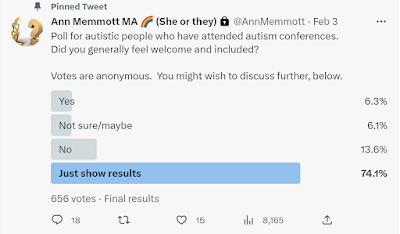Too many autistic people are asked to live unbearable lives.
Now deafened and blinded by sensory overwhelm in the world, so many are forced through one painful, exhausting day after another. Society's misunderstandings and the lack of balance in some media mean that they are also at huge risk of experiencing exclusion, bullying and violence. The research is shocking stuff. Actually, that statement is true in another sense - a lot of research on autistic people has indeed been shocking in the way it was conducted, with little to no consideration of whether research teams were harming autistic people. See http://annsautism.blogspot.com/2019/01/autism-some-vital-research-links.html for a useful starting point for some of the best, and worst, of autism research. Do brace yourselves.
Understandably, brains can only handle so much. There's a point where they can't take any more. When that happens, the autistic person's distress levels reach a point where one of several things may happen. In my daily work, I train on autistic meltdown and shutdown, amongst other states of distress, and these feature in the publications I have co-authored with many others. As an autistic professional, I can also speak from my own set of experiences, and as a parent and carer, from wider experiences within the family. Note that many autistic people are as yet undiscovered, possibly because their lives are doable enough that they have few or any of these, and therefore don't get diagnosed, or even recognised as autistic.
Shutdown - the autistic person may enter a state that looks maybe like that photo above. Quiet, distressed, almost unable to move or speak. This is very common, and many autistic people only, or nearly always, experience this as the distress mechanism.
Flight - they may run away from the distress.
Flop - they may collapse on the floor.
Fright - they may enter a state of unimaginable anxiety and panic.
Meltdown - they may enter a state where they seem angry and as if they are being deliberately violent. Like the other states of overwhelm, this is a brain response to being totally, utterly overloaded and exhausted beyond measure. Possibly, from good research, in terrible untreated physical pain from healthcare situations. It is not a choice of anger to get their own way, or because they don't care what happens to other people, or because they want to spoil the fun of others.
Notice how many descriptions of brain responses there are.
Would you expect the media, e.g. fairly serious newspapers that influence financial decision-makers, to put in a selection of personal accounts reflecting each of these? I would.
Do they?
No, it appears that they don't.
I did a quick survey of two of the papers in the UK. Serious ones. I won't name them, as it's not a critique of them in particular.
Paper 1: 60 mentions of autism, ever. Fair enough. A few since early 2021. But of any of those 60, only 3 mentioned shutdown, for example. None with any explanation. Article after article on meltdown. I'll be clear again - those personal accounts are important and yes, they absolutely should be heard.
Paper 2: Since early 2021, 9 articles mentioning autism. Autistic children as a 'pain in the arse', as the spoilers of holidays and parties, as the bringers of violence. Only one article mentioned shutdown, and that only in passing with no explanation.
None seemed to focus on e.g. autistic people with a learning disability, or autistic people who are nonspeaking. None seemed to focus on giving people links to useful materials, other than an occasional book on children that featured the words meltdowns and hitting in their opening explanations.
If you were a financial decision-maker, reading those papers as your daily source of information on autistic people, how balanced a view are you getting? How easy would it be for your Accountant or Solicitor, your Chartered Surveyor or Doctor, your neighbour or friend, to disclose to you their diagnosis or identity as autistic, if that's all you knew, from the Press? Would you know how to support them and be an ally?
I'm grateful to every person who makes themselves vulnerable by putting their personal stories in the Press, in an important effort to educate people and create a better end result. It is vital that we hear each person, and respect fully their set of personal experiences.
It is also vital that we hear and see so much more about the other states that affect autistic people, especially when those are situations that might be the majority.
Recently, very glad for example to see the documentary by Chris Packham on BBC2, Inside Our Autistic Mind, which featured a woman who goes into shutdown, and a man who is non-speaking. That wider range of voices (spoken, assistive communication or otherwise) is what we need.
It's all very well for society to keep saying, "If you've met one autistic person, you've met one autistic person". But, we need to move away from the single stereotype of autism = meltdown, please. We need a world that is a safer, kinder place for all of us - and one where autistic distress, overwhelm & pain are understood in all their presentations, and responded to with kindness & the right support.
Thank you for reading.


